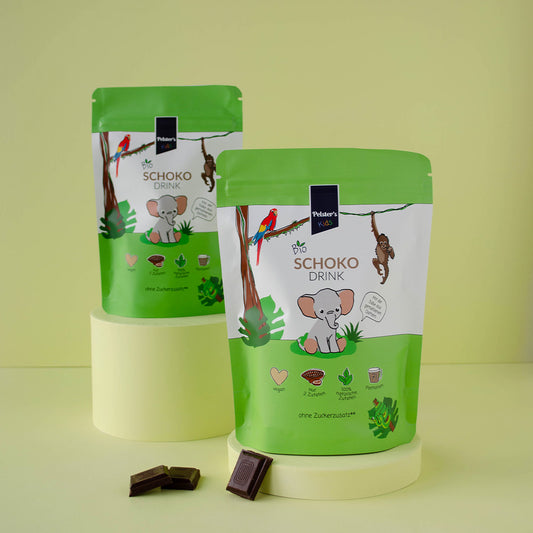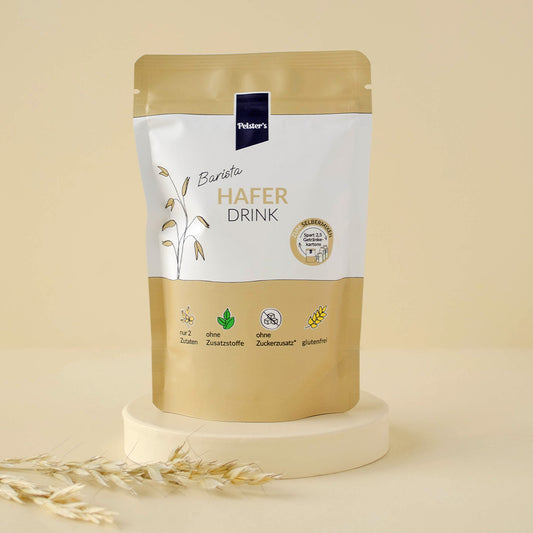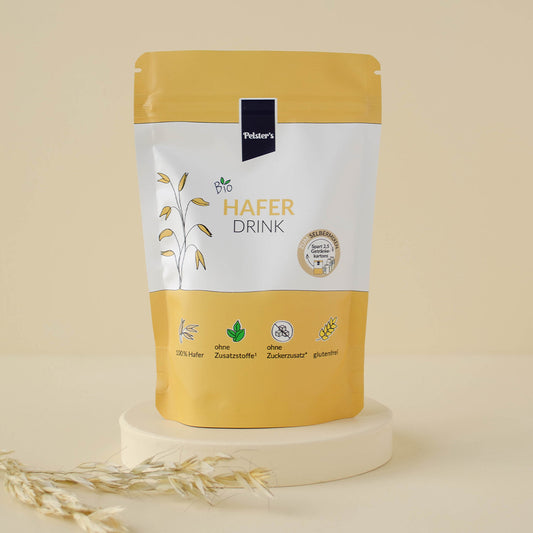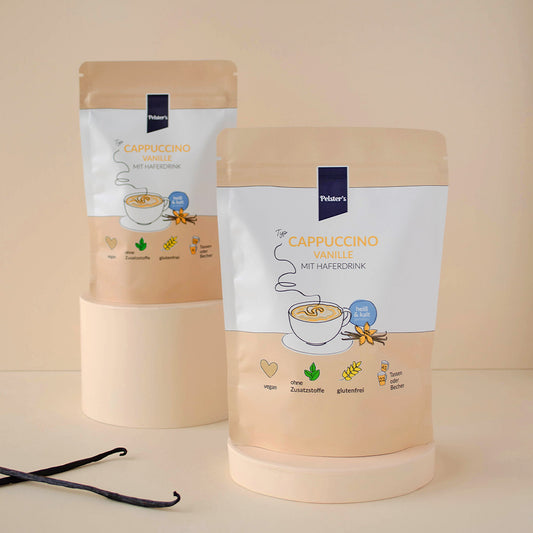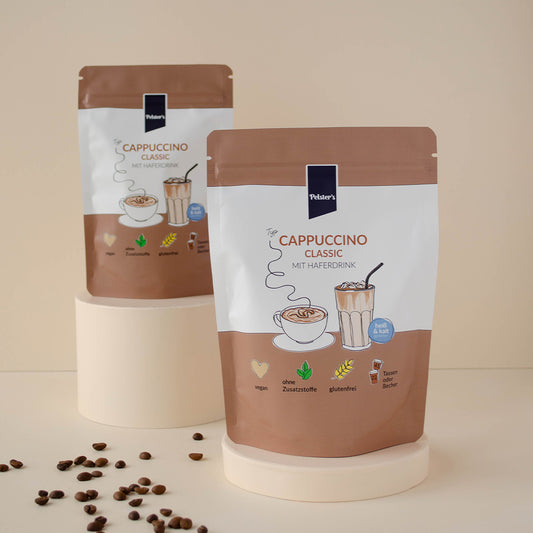Vegan diet in general
A vegan diet means the exclusive consumption of plant-based foods. This type of diet has become increasingly popular in recent years, so that over 1% of the German population eat a vegan diet (1).
The avoidance of animal products is usually voluntary and conscious, with the main motives for the vegan diet being ethical reasons, aspects of ecology and sustainability, as well as health reasons (1).
Due to the increasing popularity of the vegan diet, the range of vegan substitute products available is also increasing. These include meat, milk, egg or fish substitutes as well as special nutritional supplements and fortified foods (2).
Importance of nutrition for the development of children
Infants and (small) children belong to a population group that has special nutritional requirements. For them, nutrition has a major influence on growth, development and physical well-being. In the first few months after birth in particular, the digestive organs, metabolism, immune system and neuromotor development are still maturing. Due to growth in infancy and childhood, there is a high energy and nutrient requirement, whereby the optimal nutrient supply is essential for physical and mental development, concentration and performance, as well as strengthening the immune system. A balanced diet is the main focus (3).
Critical nutrients of a vegan diet
First of all, it should be noted that the risk of nutrient deficiency/undersupply is highest in population groups with special nutritional requirements. These groups include infants and adolescents, pregnant women and breastfeeding women. They have special nutritional requirements to maintain normal physical functions, growth and development (4).
In a vegan diet, the most critical nutrient is vitamin B12 (1, 4). It is available to humans in a form that is almost exclusively found in animal foods. For this reason, people who follow a vegan diet are encouraged to take vitamin B12 in the form of dietary supplements (1).
Other potentially critical nutrients are protein, long-chain fatty acids (DHA and EPA), riboflavin (vitamin B2), vitamin D, calcium, iron, iodine, zinc and selenium (1). In contrast, a plant-based diet provides a good supply of vitamin C, vitamin E, thiamine, folate, magnesium, potassium, fiber and phytochemicals (1).
Critical nutrients of a vegan diet in children (VeChi Youth Study)
There is still insufficient data and studies to make precise statements about the health and nutritional status of children with a vegan diet (2). However, existing studies show that children who eat a vegan diet experience normal growth and development. Some studies indicate that some children are thinner or smaller than the reference population (2).
According to the leaders of the VeChi Youth Study, the results show that with a mixed, vegetarian and vegan diet, the supply of the main nutrients and most vitamins and minerals is sufficient for the majority of participants. This also applies to vitamin B12, which is sufficient for most children and was supplemented by 88% of participants. There were no significant differences in energy density and intake between the diets. Furthermore, the supply of vitamin B2 and iodine was critical in all diets, as were the intake data for calcium and vitamin D. However, these results cannot be transferred to the entire German population and their conclusion is therefore limited (5).
What are the benefits of a vegan diet for children?
If a vegan diet includes all essential nutrients in the appropriate amounts and many nutritionally beneficial nutrients, then a vegan diet can have positive long-term effects on children's health. Nutritionally beneficial is defined as a dietary pattern that is high in fiber and low in added sugar and saturated fat. This nutrient pattern can be associated with a low prevalence of overweight, obesity and a low risk of cardiometabolic diseases in adulthood (4).
Furthermore, a high consumption of whole grains, fruit and vegetables reduces cardiovascular diseases and diabetes mellitus type 2 due to the fiber they contain. The secondary plant substances they contain reduce the risk of metabolic and cardiovascular diseases, ischemic heart disease and cancer. The holistic lifestyle must also always be taken into account (1).
This should be taken into account when feeding a vegan diet to children!
When feeding children, it is essential that all nutrients are consumed in the prescribed amounts (1). Optimal nutrient supply can be supported by fortified foods or by taking supplements. Regular medical checks of the supply status are important so that any deficiencies can be identified early and counteracted with nutrient supplements. If necessary, advice from qualified nutritionists should be sought (1, 4).
Food recommendations
The table below provides a selection of foods that match the critical nutrients, although these recommendations are not specific to children (1). In addition, foods are always presented as nutrient packages and therefore provide not only the critical nutrients listed, but many more.
| Critical nutrient | Plant-based nutrient suppliers |
| protein | Pulses, (nuts), (whole grain) cereals, potatoes |
| EPA, DHA | Foods enriched with microalgae oil |
| Vitamin D | Some edible mushrooms (champignon, chanterelles), foods fortified with vitamin D |
| Riboflavin | Oilseeds, (nuts), pulses, various vegetables, whole grains |
| Vitamin B12 | Foods fortified with vitamin B12 |
| Calcium | Vegetables (broccoli, kale), (nuts), legumes, meat substitutes made from soya, tofu, mineral water (> 150 mg/L calcium), calcium-fortified foods |
| iron | Pulses, oilseeds, (nuts), whole grains, vegetables (spinach) |
| iodine | Iodized and fluorinated table salt, seaweed |
| zinc | Whole grains, pulses, oilseeds, (nuts) |
| selenium | Cabbage, onions, mushrooms, asparagus, pulses, Brazil nuts |
Conclusion
In summary, a vegan diet for adults can contribute to a healthy diet if it is well planned and consists of balanced foods, as well as supplementation with vitamin B12 and possibly other critical nutrients. Parents who want to feed their children a vegan diet need sound nutritional skills, and nutritional advice from qualified nutritionists is strongly recommended. The child's supply status with all (critical) nutrients should be checked regularly (1, 4). In addition, the current study situation should always be kept under critical review so that the diet and supplementation can be critically questioned and adjusted accordingly if necessary.
Note: Nevertheless, it is important to always keep an eye on the current study situation, especially since this article is not updated regularly.
Sources
(1) Richter, M., Boeing, H., Grünewald-Funk, D., Heseker, H., Kroke, A., Leschik-Bonnet, E., Oberritter, H., Strohm, D., Watzl, B. for the German Nutrition Society (DGE). (2016). Vegan nutrition. Position of the German Nutrition Society (DGE). Nutrition Review 63(4), 92-102. Erratum in: 63(05): M262.
(2) Weder, S., Hoffmann, M., Becker, K., Alexy, U., Keller, M. (2019). Energy, macronutrient intake, and anthropometrics of vegetarian, vegan, and omnivorous children (1–3 years) in Germany (VeChi Diet Study). Nutrients, 11(4), 832.
(3) DGE. (n.d.). Nutrition of children and adolescents. DGE. [online] https://www.dge.de/gesunde-ernaehrung/gezielte-ernaehrung/ernaehrung-von-kindern-und-jugendlichen/ [last accessed: December 14, 2023].
(4) Richter, M., Kroke, A., Grünewald-Funk, D., Heseker, H., Virmani, K., Waltz, B. for the German Nutrition Society (DGE). (2020). Supplement to the position of the German Nutrition Society on vegan nutrition with regard to population groups with special nutritional requirements. Nutritional Review, Special Issue 5, 64-72. DIO: 10.4455/eu2020.044.
(5) DGE. (2020). Vegan, vegetarian, mixed diet. Press release. 14th DGE field report [online] https://www.dge.de/presse/meldungen/2020/vegan-vegetarisch-mischkost-nur-geringe-unterschiede/ [last accessed: December 14, 2023].






